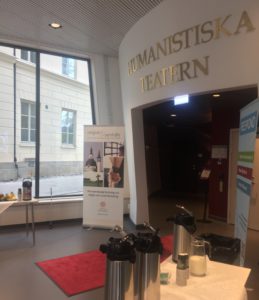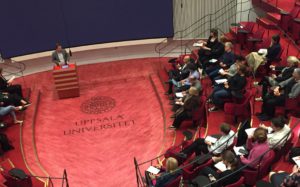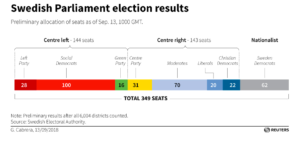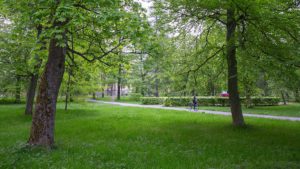By Jenni Wirman and Önver Cetrez, Uppsala University
MGN Sweden kick-off reflections

Outside the Humanities Theatre, venue for the kick-off [Photo: Jenni Wirman]
After much anticipation and excitement, the kick-off of the Migration Governance Network (MGN) in Sweden came and left. The distinguished speakers Lisa Pelling, Kristof Tamas and Tove Hovemyr delivered interesting updates and analyses of the ongoing parliamentary debates due to the elections earlier in September that sparked an engaged debate in the audience.
The aftertaste of the event was even better, generating a positive energy and response among the participating stakeholders for the upcoming RESPOND events. Stakeholders sent representatives from Kompis Sverige, Kvinna till Kvinna Foundation, Read for Integration,Red Cross University College, Red Cross Youth Uppsala, the Swedish Church in Uppsala, Swedish for Immigrants(SFI), Swedish Public Employment Service Uppsala-Knivsta, Swedish University of Agricultural Sciences, Uppsala municipality, Uppsala Students’ union, Uppsala University and Varken hora eller kuvad.The kick-off was moderated by the researchers and administrators of RESPOND: Jenni Wirman, Karin Borevi, Soner Barthoma, and Önver Cetrez.
Finally, the work can begin, in which this newly established migration governance network will play a vital role. With the mutual interest to ground the project in up-to-date policy recommendations, the dynamic assemblage from various fields of expertise that is the network can provide just those. With those words, many thanks to all the speakers and participants this far!

Kristof Tamas from The Migration Studies Delegation [Photo: Jenni Wirman]
As a first step, a roundtable with stakeholders to discuss topics related to the ongoing research will be held in December 2018. This time, issues related to border, protection, reception, and integration will be deliberated and fed into the RESPOND working paper series. An additional ambition of the roundtable sessions is to gather stakeholders within the field of migration to enhance existing and enforce new networks. We aim to gather stakeholders twice a semester for up to date topics. We also welcome all stakeholders to contribute with a short text about their projects in our RESPOND-blog.


